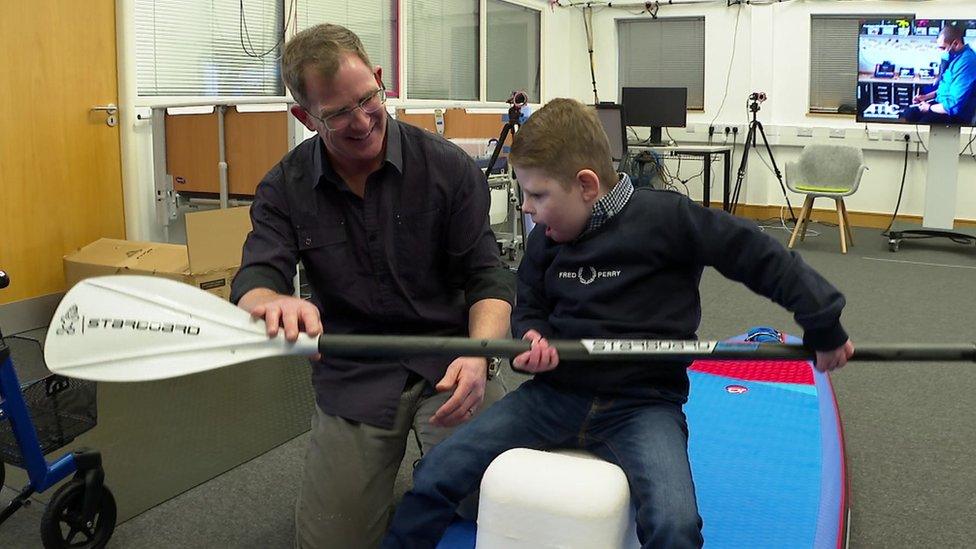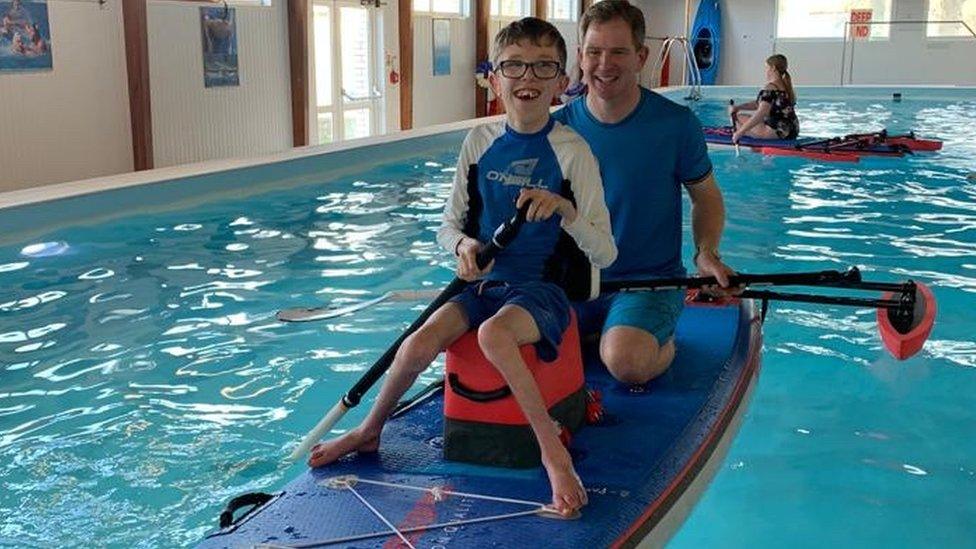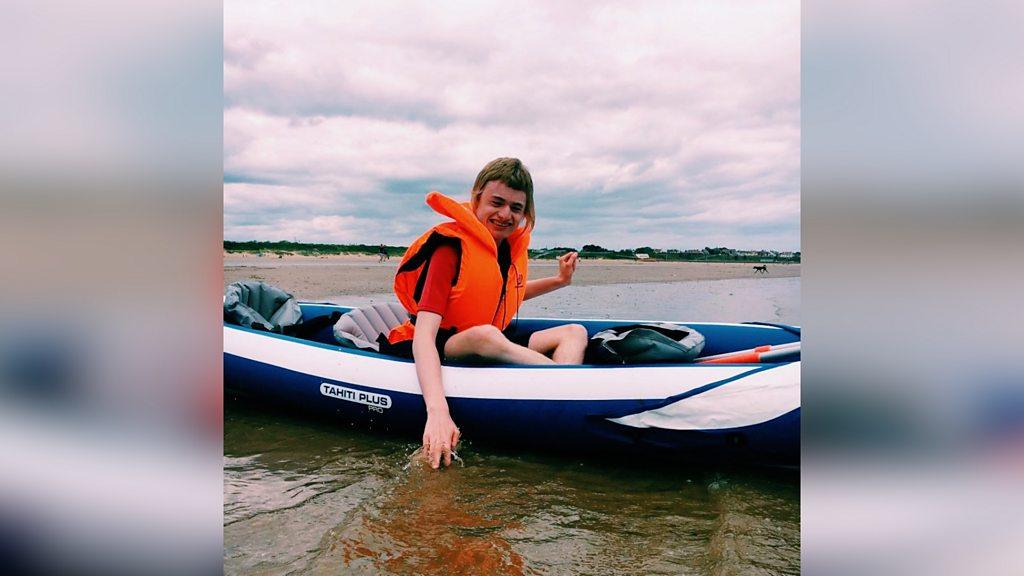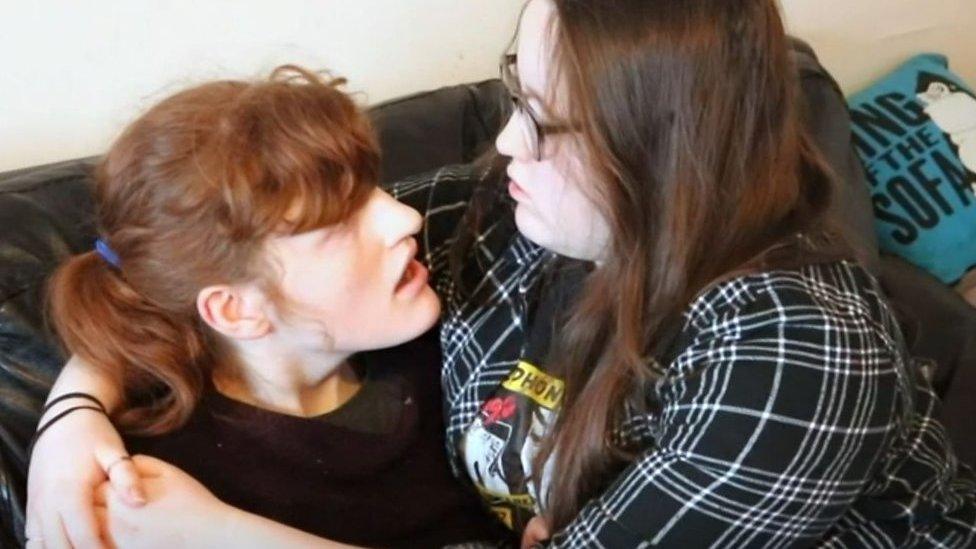Disability: Special paddleboards help children go into the sea
- Published

Rowen first had to visit a studio where his body was scanned in order for a prototype to be made
For eight-year-old Rowen, the ocean has always held a particular fascination.
But having Angelman syndrome, external means he has never managed to swim in the sea.
Angelman syndrome is a rare genetic condition which affects the nervous system and causes severe physical and learning disabilities.
Now a team based at University of Wales Trinity St David is building a custom paddleboard for him to take to the waves.
The first step was taking scans of the children and working out how to create comfortable seats which could be attached to the boards.
Then a prototype was built using a huge 3D printer, a lot of glue and hours of dedication by the team of four.
Rowen's mother Hayley said he used to "seize all day and sleep 23 hours a day".
But now his condition is better managed he is able to go to school and she is keen for him to make the most of his childhood.
"We would never be able to even experience anything like this," Hayley said.

Sixteen-year-old Rhys has also got a specially adapted paddleboard
"The thought of even trying to get down the beach and get somebody to get to do anything like this, it wouldn't happen, it would be a write off."
Another family benefiting from the paddleboard is that of 16-year-old Rhys.
He has a rare syndrome meaning he lacks physical strength and is hyper-mobile.
Rhys, who lives in Swansea with his mother Adele, is also deaf and blind.
"As his sight diminishes and his hearing, it's really important for him to be active and have things which are accessible to keep himself as healthy as possible," Adele said.
"This is just another thing that he can do. It also means that he's not going to be bored, he's going to have stuff to do and meet people. I'm delighted."
Testing is rigorous and so before hitting the waves the boys are taken to a pool on the university's campus in Carmarthen to test out the boards, helped by water sports instructor Miyah Periam.
"Everybody knows the benefits of going outside, everybody knows the benefits of exercising and being outdoors in the sunshine and having saltwater on your skin, it's amazing for everybody," she said.
"For somebody who's disabled and hasn't had that before, seeing them do it for the first time is insane. It's such a wonderful experience to have."
'Hate to say no'
The paddleboards cannot be bought in a shop and work with any child up to the age of 17 who is affected by a condition.
The team behind the boards and other specialised equipment is led by Dr Ross Head from University of Wales Trinity Saint David in partnership with Carmarthen-based charity Cerebra.
"They put a bunch of designers in a room with a phone and said 'when that rings answer it and solve the problems'… and that was 17 years ago," he said.
"We hate to say no basically.
"This job is just amazing. We might only make one or two of something but they are so well used and give children a better life. It's a really really nice rewarding thing to do."
Mr Head said his favourite build was a special set of triathlon equipment made for a girl called Poppy.
"It was a really audacious project, really hard work, took a long time, a huge risk assessment from here to the floor long but to see the smile on that little girl's face was amazing," he added.
"I got asked at a conference actually why do you do it when all these things cost a lot of money and I skipped back through the video to see Poppy's face at the end of the triathlon and just said because of that."

LEGENDS OF WELSH SPORT: How Tanni Grey-Thompson became one of Britain’s most successful Paralympians
POWER TO THE PEOPLE: The X-Ray team investigate your consumer complaints

- Published4 August 2020

- Published21 April 2018
